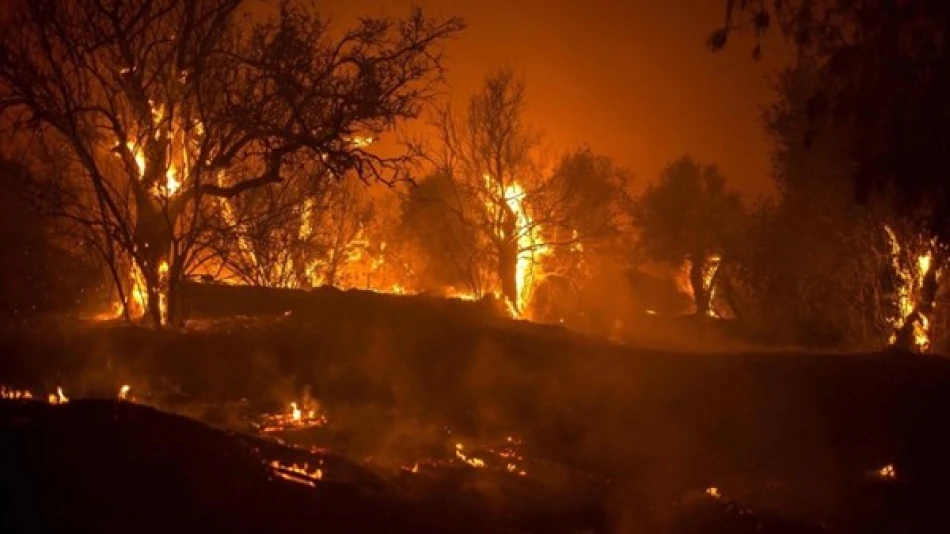
Massive Forest Blaze Rages Near Athens, Prompting Evacuation Efforts
Suspected Arson Fuels Massive Wildfire Near Athens as 400 Residents Evacuated
A large-scale wildfire burning southeast of Athens appears to be the result of deliberate arson, according to local officials, highlighting Greece's ongoing vulnerability to both natural disasters and criminal activity during the country's increasingly dangerous fire season. The blaze, located approximately 35 kilometers from the Greek capital, has prompted the evacuation of 400 people and destroyed numerous homes, underscoring the growing threat that intentional fires pose to Mediterranean communities already stressed by climate change.
Evidence Points to Deliberate Act
The mayor of one affected village told Greece's state broadcaster ERT that investigators discovered a gas canister at the fire's origin point. Local residents reported witnessing suspicious behavior from an individual on a motorcycle in the area before the flames erupted. This evidence suggests the fire was not caused by the typical culprits of electrical equipment, lightning, or accidental human activity that account for most wildfires in the region.
The discovery adds a criminal dimension to what is already shaping up as another challenging fire season for Greece, a country that has experienced increasingly severe blazes in recent years due to rising temperatures and prolonged drought conditions.
Massive Response Effort Gains Ground
Greek firefighting teams launched an extensive operation beginning in the early morning hours Saturday, deploying multiple aircraft and ground crews to contain the spreading flames. Strong winds initially hampered efforts by fanning the fire across the rural landscape, but Greek media reports indicate firefighters have gained significant control over the situation.
The scale of the response reflects lessons learned from previous devastating fires, including the 2018 Mati wildfire that killed 102 people just northeast of Athens. That disaster exposed critical gaps in Greece's emergency response capabilities and evacuation procedures, leading to substantial reforms in the country's wildfire management approach.
Growing Pattern of Arson Across Fire-Prone Regions
Intentional fire-setting has become an increasingly serious problem across Mediterranean Europe, with countries like Spain, Italy, and Portugal also reporting rising incidents of suspected arson during fire seasons. In Greece specifically, authorities have struggled with individuals who deliberately start fires for various motives, from insurance fraud to land development schemes or simple pyromania.
The timing of this incident is particularly concerning, as Greece enters what meteorologists predict could be another severe fire season. Climate data shows the eastern Mediterranean region is warming faster than the global average, creating drier conditions that make forests and grasslands more susceptible to rapid fire spread.
Economic and Environmental Implications
While the full extent of property damage remains unknown, the destruction of homes and the evacuation of 400 people will likely result in significant economic losses for the affected communities. Greece's tourism-dependent economy is particularly vulnerable to wildfire damage, as images of burning landscapes can deter visitors during the crucial summer season.
The environmental impact extends beyond immediate property damage. Repeated fires in the same regions prevent forest regeneration and contribute to soil erosion, creating long-term ecological problems that can take decades to resolve. For a country already grappling with the economic aftermath of years of financial crisis, these additional burdens strain both local and national resources.
As climate change continues to extend fire seasons and increase fire intensity across southern Europe, the challenge of preventing and responding to both accidental and intentional blazes will likely require enhanced international cooperation and more sophisticated detection systems to identify potential arsonists before they can act.
Most Viewed News

 Layla Al Mansoori
Layla Al Mansoori






